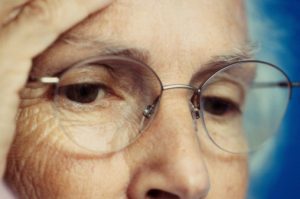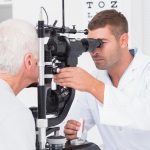 Many of us believe that the older we get, the more it is expected that many of our bodily functions simply won’t work like they used to. Sure, we may no longer be able to run a mile, or even lift up heavy objects, but if your vision is getting worse, it could be a sign of a shorter life.
Many of us believe that the older we get, the more it is expected that many of our bodily functions simply won’t work like they used to. Sure, we may no longer be able to run a mile, or even lift up heavy objects, but if your vision is getting worse, it could be a sign of a shorter life.
Although age-related macular degeneration is a common condition that affects people as they age, new research suggests as your vision gets worse, more years will be knocked off your life.
Advertisement
Failing vision linked with shorter life in seniors
 The findings were concluded based on research conducted on more than 2,500 senior adults – aged 65 to 84. Their vision was assessed at the beginning of the study and once again two, six and eight years later. Researchers found that vision loss was associated with the shortening of the seniors’ lives.
The findings were concluded based on research conducted on more than 2,500 senior adults – aged 65 to 84. Their vision was assessed at the beginning of the study and once again two, six and eight years later. Researchers found that vision loss was associated with the shortening of the seniors’ lives.
It may appear obvious that the worse vision gets, the less years you may have, but researchers do offer some theories which may better link poor vision and a shorter life.
Researchers suggest that when seniors lose their vision, they also lose their ability to perform simple daily tasks. From their findings, researchers pointed out death associated with the inability to perform daily tasks increased three percent each year of the study – after eight years risk of death was up to 31 percent.
Participants whose eye exams revealed their vision declined a letter size on the eye exam chart had a 16 percent increased risk of death due to the inability to perform daily tasks.
The research team said, “Our findings have multiple implications. First, these findings reinforce the need for the primary prevention of visual impairment. Moreover, the early detection of disabling eye diseases is suboptimal in the U.S. health care system, leading to otherwise preventable vision impairment. Finally, many Americans live with vision impairment that is correctable through the proper fitting of glasses or contact lenses.”
Advertisement
Lastly, the findings suggest that with failing vision, seniors require further assistance in order to reduce their risk of death by inability to perform daily tasks.
How to maintain your vision
 The ability to see, especially in our senior years, is important for life longevity, as revealed by the recent findings. You don’t have to succumb to age and lose your vision; there are many things you can begin to do to ensure you do not become a victim of age-related vision loss. Below are some effective tips on how you can maintain your vision right up into your 90s!
The ability to see, especially in our senior years, is important for life longevity, as revealed by the recent findings. You don’t have to succumb to age and lose your vision; there are many things you can begin to do to ensure you do not become a victim of age-related vision loss. Below are some effective tips on how you can maintain your vision right up into your 90s!
- Go for scheduled eye exams to detect any changes in vision early on.
- Ensure your vision prescriptions are up-to-date.
- Always wear sunglasses when venturing outside.
- Don’t look directly into the sun.
- Know your family history.
- Eat foods high in eye-friendly nutrients, like carrots, kale and other dark leafy greens.
- Maintain a healthy weight.
- Quit smoking.
- Ensure you are getting adequate sleep.
- Give your eyes a rest, especially if you stare at a screen all day.
- Ensure you are wearing and cleaning contact lenses properly.
- Protect your eyes in workplace environments by wearing protective eye gear.
- Manage your diabetes, high blood pressure and cholesterol.
Healthy lifestyle habits can better help you maintain your vision for the long run without the threat of a shorter life.
